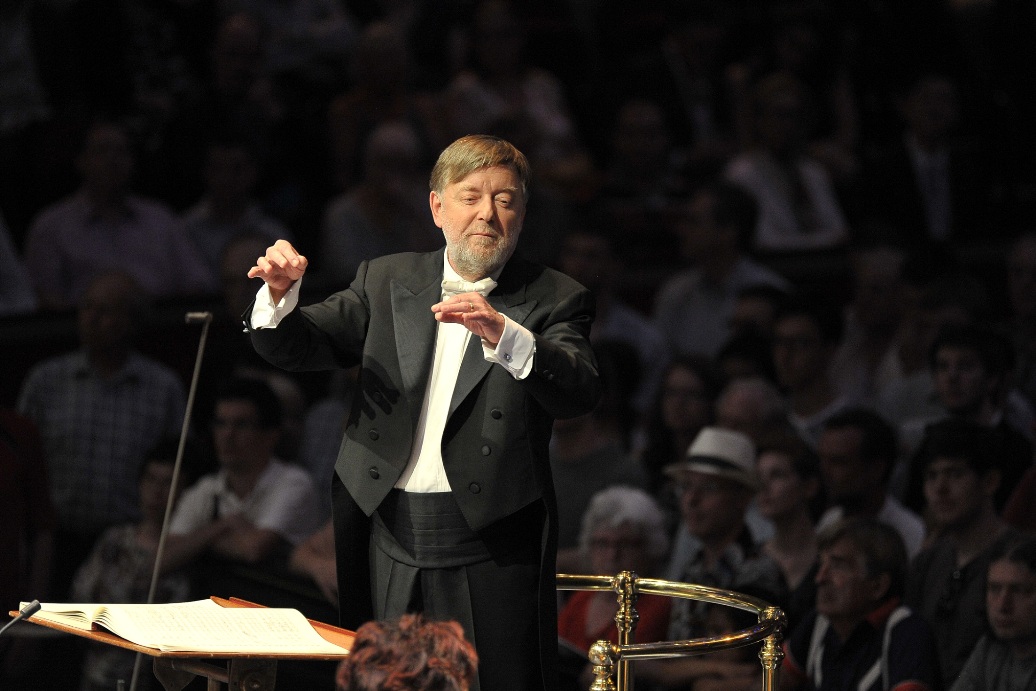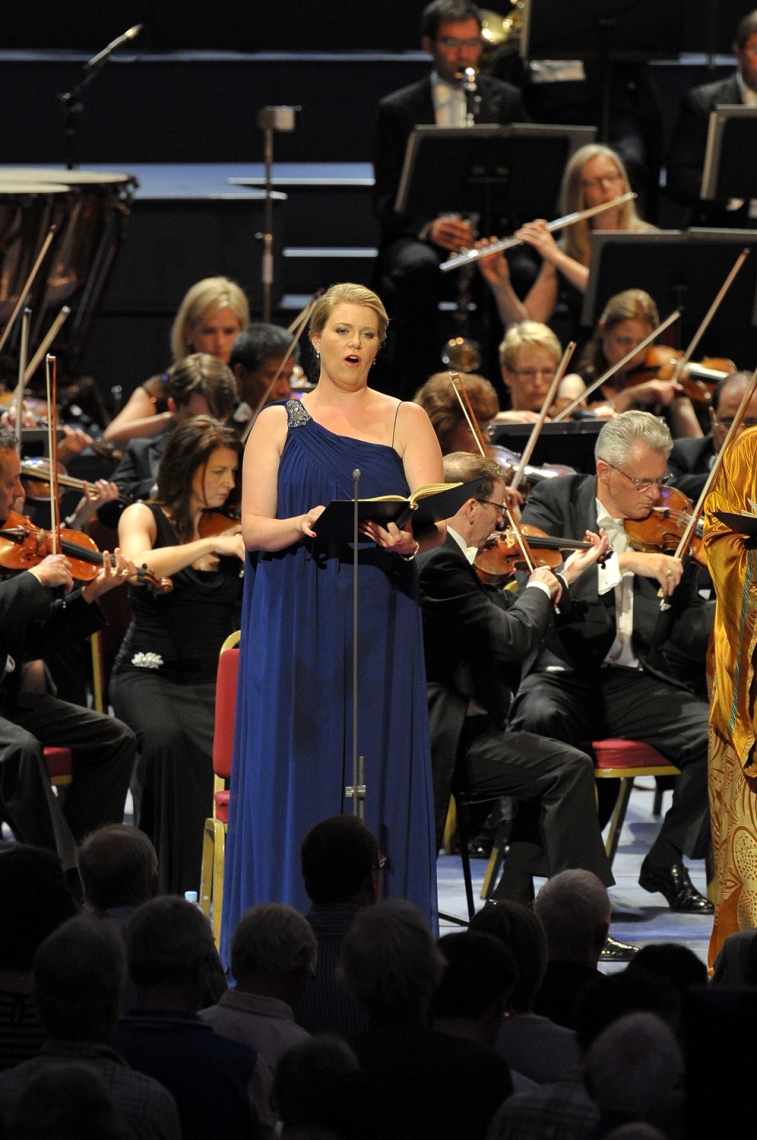First Night of the Proms, BBCSO, Davis, Royal Albert Hall | reviews, news & interviews
First Night of the Proms, BBCSO, Davis, Royal Albert Hall
First Night of the Proms, BBCSO, Davis, Royal Albert Hall
Much-loved Elgarian completes his oratorios sequence with a subdued coda

“And suddenly there came from heaven a sound as of the rushing of a mighty wind, and it filled all the house where they were sitting.” To fill the Albert Hall – where a sizeable number of participants are standing, of course, in the best place – as handsomely as this, and as clearly, takes some work.
I only wish this one had been The Kingdom’s great predecessor, The Apostles, which the same team performed earlier this year in their Barbican season. The Kingdom boasts similarly diaphanous orchestration at the right moments, introspection and a multitude of themes of great individual beauty. But what’s the plot? Christ’s right-hand men hold a meeting, the “mighty wind” kicks off babbling in tongues, they do a half-hearted miracle, they get arrested and released, say some prayers. There’s no place here for the big action nor for the fine-drawn psychological studies which fire up The Apostles (the characters of Mary Magdalene and Judas provide the pillars to the Passion there).
 Nor is there the great arch structure of The Dream of Gerontius, though no-one could have stitched in and phrased the episodic detail better than Davis (pictured right last night), starting with a Prelude that felt almost as impulsive and fluid as the opening of the Second Symphony. Wistful details like the bittersweet clarinet and the violin solo (welcome back, Stephen Bryant) floated into the big space effortlessly, while the sound had height and depth from seraphic strings down to baleful tuba. Remarkable, too, the buzzsaw effect of muted horns which accompanies a mystic chorus.
Nor is there the great arch structure of The Dream of Gerontius, though no-one could have stitched in and phrased the episodic detail better than Davis (pictured right last night), starting with a Prelude that felt almost as impulsive and fluid as the opening of the Second Symphony. Wistful details like the bittersweet clarinet and the violin solo (welcome back, Stephen Bryant) floated into the big space effortlessly, while the sound had height and depth from seraphic strings down to baleful tuba. Remarkable, too, the buzzsaw effect of muted horns which accompanies a mystic chorus.
Choirs? Remarkable. We already know that the BBC Symphony Chorus is the best in London – which isn’t to say that their counterparts aren’t very fine – and the BBC National Chorus of Wales simply amplified their togetherness, the blazing climaxes and the soft, paler casts of thought.

That, inevitably, was a pensive highlight, bringing cool thoughts of night to the end of a sweltering day. The other was the slow final epilogue to the Lord’s Prayer. How extraordinary that Elgar introduces yet another theme of disconsolate sadness at the last minute. What is he trying to say: faith is dying out, no longer exists, dark times lie ahead? Remember that The Kingdom was premiered only eight years before the outbreak of the First World War (and how could I forget that, having stumbled out in tears earlier from the Imperial War Museum's extraordinary new galleries devoted to that?) So this quiet and troubling curtain may well have served as the first of the Proms’ many tributes to the centenary of a terrible event.
rating
Explore topics
Share this article
Add comment
The future of Arts Journalism
You can stop theartsdesk.com closing!
We urgently need financing to survive. Our fundraising drive has thus far raised £49,000 but we need to reach £100,000 or we will be forced to close. Please contribute here: https://gofund.me/c3f6033d
And if you can forward this information to anyone who might assist, we’d be grateful.

Subscribe to theartsdesk.com
Thank you for continuing to read our work on theartsdesk.com. For unlimited access to every article in its entirety, including our archive of more than 15,000 pieces, we're asking for £5 per month or £40 per year. We feel it's a very good deal, and hope you do too.
To take a subscription now simply click here.
And if you're looking for that extra gift for a friend or family member, why not treat them to a theartsdesk.com gift subscription?
more Classical music
 Hallé John Adams festival, Bridgewater Hall / RNCM, Manchester review - standing ovations for today's music
From 1980 to 2025 with the West Coast’s pied piper and his eager following
Hallé John Adams festival, Bridgewater Hall / RNCM, Manchester review - standing ovations for today's music
From 1980 to 2025 with the West Coast’s pied piper and his eager following
 Kaploukhii, Greenwich Chamber Orchestra, Cutts, St James's Piccadilly review - promising young pianist
A robust and assertive Beethoven concerto suggests a player to follow
Kaploukhii, Greenwich Chamber Orchestra, Cutts, St James's Piccadilly review - promising young pianist
A robust and assertive Beethoven concerto suggests a player to follow
 Robin Holloway: Music's Odyssey review - lessons in composition
Broad and idiosyncratic survey of classical music is insightful but slightly indigestible
Robin Holloway: Music's Odyssey review - lessons in composition
Broad and idiosyncratic survey of classical music is insightful but slightly indigestible
 Classical CDs: Wolf-pelts, clowns and social realism
British ballet scores, 19th century cello works and contemporary piano etudes
Classical CDs: Wolf-pelts, clowns and social realism
British ballet scores, 19th century cello works and contemporary piano etudes
 Bizet in 150th anniversary year: rich and rare French offerings from Palazzetto Bru Zane
Specialists in French romantic music unveil a treasure trove both live and on disc
Bizet in 150th anniversary year: rich and rare French offerings from Palazzetto Bru Zane
Specialists in French romantic music unveil a treasure trove both live and on disc
 Scottish Chamber Orchestra, Ibragimova, Queen’s Hall, Edinburgh review - rarities, novelties and drumrolls
A pity the SCO didn't pick a better showcase for a shining guest artist
Scottish Chamber Orchestra, Ibragimova, Queen’s Hall, Edinburgh review - rarities, novelties and drumrolls
A pity the SCO didn't pick a better showcase for a shining guest artist
 Kilsby, Parkes, Sinfonia of London, Wilson, Barbican review - string things zing and sing in expert hands
British masterpieces for strings plus other-worldly tenor and horn - and a muscular rarity
Kilsby, Parkes, Sinfonia of London, Wilson, Barbican review - string things zing and sing in expert hands
British masterpieces for strings plus other-worldly tenor and horn - and a muscular rarity
 From Historical to Hip-Hop, Classically Black Music Festival, Kings Place review - a cluster of impressive stars for the future
From quasi-Mozartian elegance to the gritty humour of a kitchen inspection
From Historical to Hip-Hop, Classically Black Music Festival, Kings Place review - a cluster of impressive stars for the future
From quasi-Mozartian elegance to the gritty humour of a kitchen inspection
 Shibe, LSO, Adès, Barbican review - gaudy and glorious new music alongside serene Sibelius
Adès’s passion makes persuasive case for the music he loves, both new and old
Shibe, LSO, Adès, Barbican review - gaudy and glorious new music alongside serene Sibelius
Adès’s passion makes persuasive case for the music he loves, both new and old
 Anja Mittermüller, Richard Fu, Wigmore Hall review - a glorious hall debut
The Austrian mezzo shines - at the age of 22
Anja Mittermüller, Richard Fu, Wigmore Hall review - a glorious hall debut
The Austrian mezzo shines - at the age of 22
 First Person: clarinettist Oliver Pashley on the new horizons of The Hermes Experiment's latest album
Compositions by members of this unusual quartet feature for the first time
First Person: clarinettist Oliver Pashley on the new horizons of The Hermes Experiment's latest album
Compositions by members of this unusual quartet feature for the first time

Comments
Though The Kingdom wouldn't